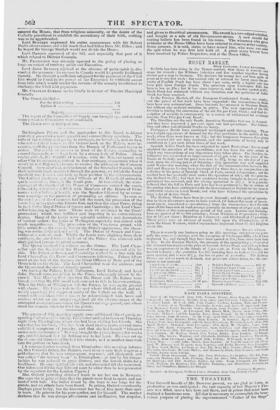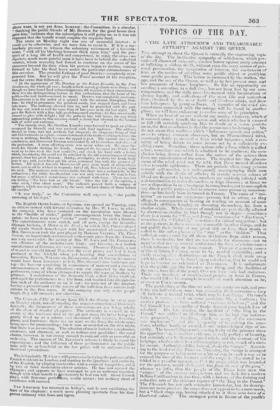TlIE THEATRES.
THE farewell benefit of Mr. Dow'ros proved, we are glad to learn, as productive as was anticipated: the vast capacity of her alajesty's The- atre wes filled, save a box here and there, and at prices that must hare realized a handsome sum. All that is necessary to accomplish the bene- volent purpose of placing the superannuated "Fatter of the Stage
above want, is not yet done, however: the Committee, in a circular, " thanking the public friends of Mr. Dowton for the good house they gave him," intimate that the subscription is still going on. as it was not expected that the benefit would complete the requisite fund. The Scene on Monday night was one of mournful interest : it could not he otherwise, and we were fain to avoid it. If it is a me- lancholy pleasure to witness the voluntary retirement of a favourite
actor, " with all his blushing honours thick upon him," and the pro- spect of a long life of health and competence, to enjoy the Winn! eum
(lignite:it', much more painful must it have been to behold the enfeebled veteran, whom necessity had forced to continue on the scene of his successes beyond the time when his powers began to decline, coming forward to take his final leave under the particular circumstances of this occasion. The grateful feelings of poor Dowrcr completely over- powered him. But we will give the Times' account of his reception, and the scene that followed--
" At the appearance of Mr. Dowton as if Robert .71ranible, in the Poor Geallewau, the whole pit rose ; handkerchiefs waved, garlands were (lung; and though we have heard loud acknowledgments, till wearied of their C01111110!MUS, there was the distinguishing feature in this enthusiasm, that the heart of the lpublic—the real heart—seemed to speak. Dowton was completely overcome. lis entrance is in the midst of a quarrel with the servant, Humphrey Dob- bins: he tried to pronounce the petulant words, but stopped short, and b orst into tears. The audience cheered him on, and he proceeded with the part. lie has not acted so well for some time of late years as he did last night. lie gave Sir Robert with a fine, full, gned-humoured unction ; Iii: face occasionally seemed to glow with delight ; but the pathetic hits told tonne, for any thing approaching pathos on this occasion struck a chord Hutt vibrated in the bosoms both of actor and audience.
" The comedy over, Mu'. Sheridan Knowles came forward to speak an address composed by himself, and was received with loud applause. llis address, though in verse, was not poetical, but eloquent ; its eloquence being of that sort which consists in a plain, serious statement of the truth—,,t liking bocausc the cause is striking, forcible Levi:use the appeal is just. The curtain rota, at the conclusion, and discovered f)owton surrounded by all his brothers and ,isters of the profession. A more aGeting scene was never wit ne,sed. Ile came for- ward, his friends shaking his hands. Among,st the 1; r eoto.t was Crisi ; who went up to him wish the hest curdiality, and shook his hand with a Wing which, considering she could not be actitated by the old rementhrances of many present, does her great honour. Harley, attempting to shake his hand, fairly gave it up ; and, str.,telting out his arms, embraced him with the greatest af. faction. All rushed towards Dowton—all gave some mark of acknowledg- ment, and to all Inc wished to respond ; but of all, :Mrs. Glover tel cr:.ing upon his neck. The audience were enthusiastic, butt there was a 11101,111d Iv in the enthusiamt ; the white handkerchief was nut only raised to tho fenmle time,
but malty a whiskered l'01111 wos suffused with tears. TImre was In
one feeling, We have lost an old friend.' After the fall the curtain, a voice cried, (Me cheer more.' The audience poured forth a volume of applause, which was respunded to by the more subdued shouts of those behind the curtain."
" It was truly," as the Committee well express it, " the public crowning of his days."



























 Previous page
Previous page